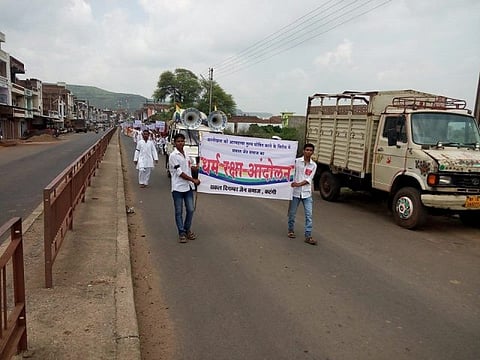

Thousands of Jain community members took to the streets on Monday in various parts of the country to protest against a Rajasthan High Court (HC) ruling earlier this month declaring "Santhara" or a fast-unto-death religious practice followed by the community for years, as "unconstitutional".
A division bench of the Rajasthan High Court on August 10 had declared Santhara unconstitutional while disposing off a public interest litigation (PIL) filed in 2006 by Nikhil Soni, contending the Santhara was akin to Sati and should be banned in the same way.
However, the court’s judgment has been severely criticised by practitioners and supporters of the religion with many calling it "flawed" and "misconstrued".
Justice (retd.) Pana Chand Jain, a former judge of the Rajasthan High Court who has been vocal in his support of Santhara, is of the opinion that not only was the petition flawed, the HC's judgement too "suffers from inherent defects".
Jain dismisses the theory that Santhara is practiced to attain moksha- freedom from the cycle of life and death. "If you could attain moksha just by fasting, wouldn't that be too easy a way?" he asks.
The purpose, he says, is to purge one's karma and reduce the burden on the soul.
In the Gian Kaur case in 1996, a five judge constitutional bench of the Supreme Court, said that though right to life did not include right to die, "right to live with dignity" included "right to die with dignity".
When life is ebbing out, Santhara can be a way to reduce the span of suffering and a person can die a dignified death.
In an opinion piece for The Hindu, Suhrith Parthasarathy, an advocate practicing in the Madras High Court, calls the judgment one which "has created a damaging precedent, which requires immediate re-examination."
He writes that the argument that Santhara is a voluntary and ethical choice of a person to live with dignity until death was not even considered by the court.
"It simply found, based on an incorrect reading of Gian Kaur, that there is no dignity whatsoever in the act of fasting, and that therefore, there exists no freedom to practise Santhara as an extension of one’s right to life under Article 21. But, perhaps, even more damagingly, the court in Nikhil Soni also rejected arguments that sought to locate such liberty in Article 25. Here, though, the folly in its reasoning wasn’t as much a product of its own making, as it was a consequence of a vague doctrine established by the Supreme Court," he continues.
There have also been comparisons made between Santhara and other practices such as sati, suicide and even euthanasia. However supporters of Jainism have maintained that Santhara is not just a practice but also means a way of life. One just does not give up food and water, but also desires, passions and physical belongings.
Prasoon Jain, who runs a photography studio at Mainpuri in UP, feels that "a person is driven to suicide by depression, frustration or anger while Santhara is the highest practice of giving up one's body on one's own volition."
Shekhar Hattangadi who has made an award-winning documentary on Santhara writes in The Hindu, "Unlike a Christian believer who looks upon the human body as a God-given ‘temple of the human soul’, a devout Jain views that same body as a 'prison of the human soul'."
While conducting research for his documentary, he spoke to several scholars and members of the Jain clergy. He gathered that Santhara, unlike suicide, is performed "with an intent to cleanse oneself of karmic encumbrances and thus attain the highest state of transcendental well-being."
There have also been doubts raised over the court’s interpretation of the centuries-old Jain practice. Shiv Visvanathan, a professor at Jindal School of Government and Public Policy, writes "Santhara is a multivalent term which cannot be reduced to the dreariness of suicide as closure or a termination. The English term cannot comprehend Santhara in terms of being a ritual exit and a rite of passage to a different world. Santhara, performed correctly, is ritual non-violence. In fact, I would feel that the court’s judgment misinterprets both the word and world."
He also asks a few pertinent questions. "As India became colonized many Indian rituals came under the critical Anglo-Saxon lens, and translation and interpretation became a critical part of legal exegesis. Is Santhara a giving up of life or of taking death in one’s stride? For a culture that believes in rebirth, is Santhara philosophically or ethically suicide?"
With inputs from IANS